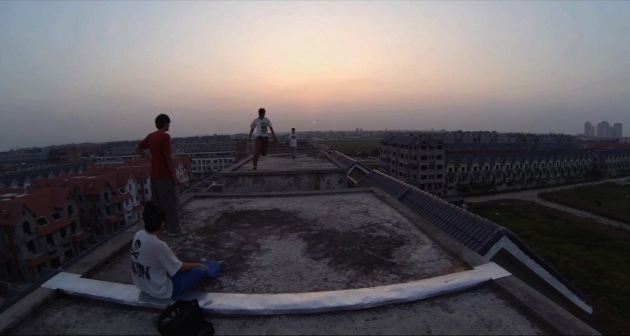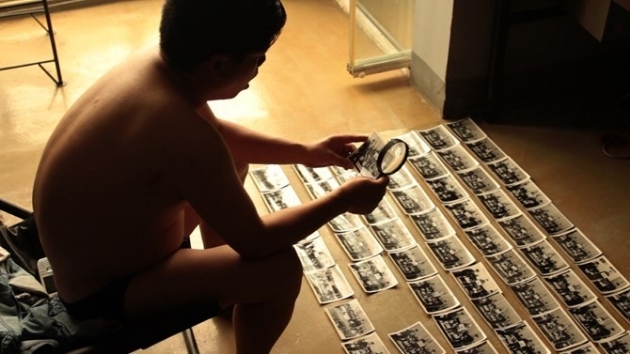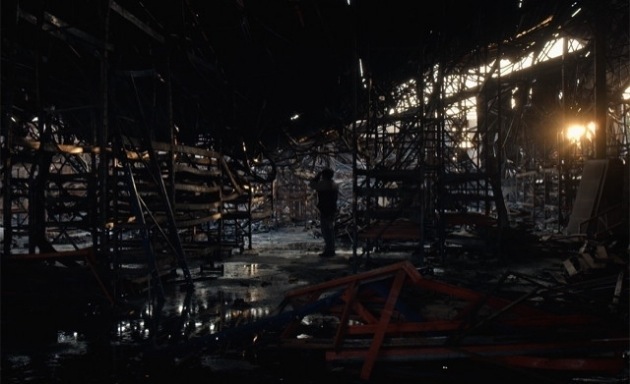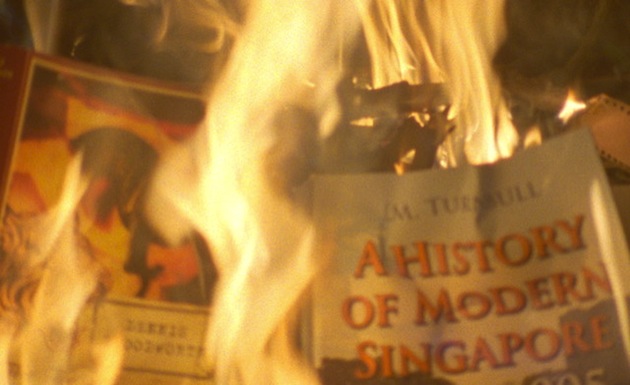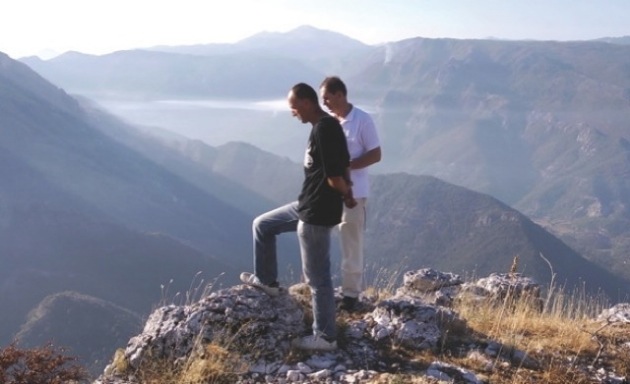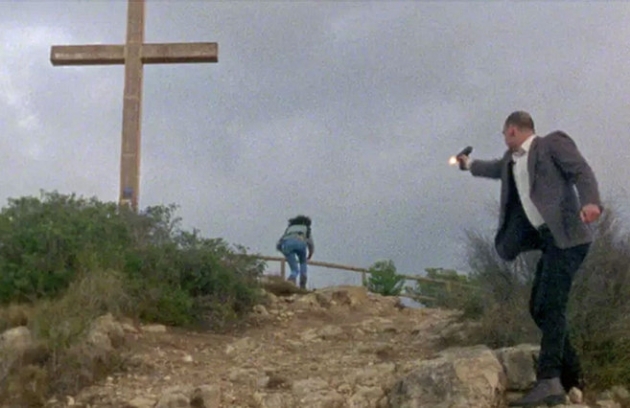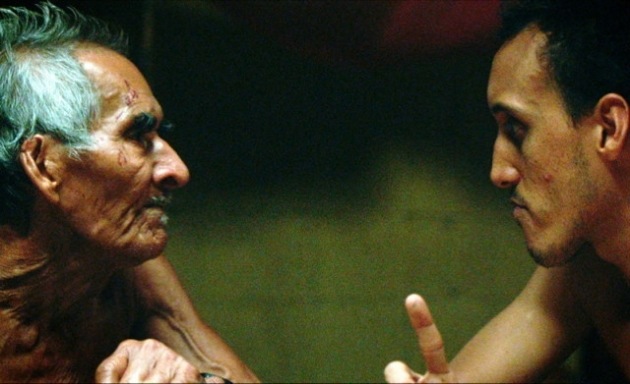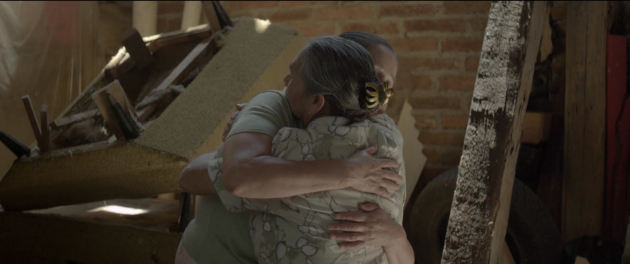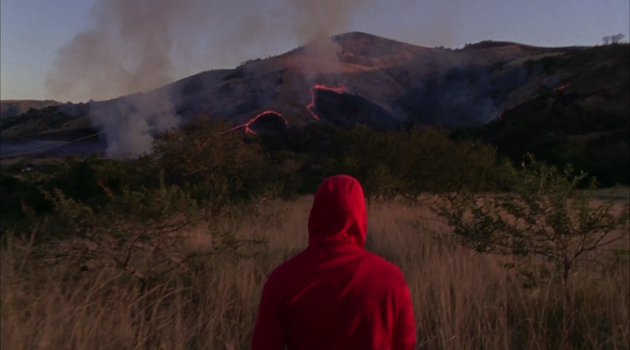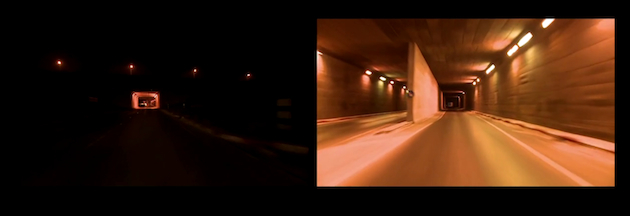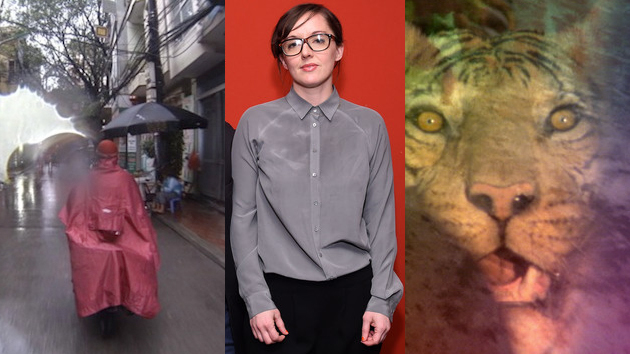Preview: Art Of The Real 2015 Expands The Cinematic Horizon
Entering only its second year, the Film Society of Lincoln Center's Art Of The Real series is, nonetheless, one of the must-see film events of the spring, and perhaps the year.
This is in large measure due to the boundless, eclectic mix of films, which, while generally classified as documentary, stretch and morph our notions of what both fiction and non-fiction filmmaking can look and feel like.
Running April 10 - 26 at the FilmLinc theater complex (full lineup and ticket info here), the series not only features a plethora of new, beguiling works from contemporary filmmakers across the globe, but also includes a tribute to the work of the audacious Agnès Varda, as well as a spotlight on reenactment in film, including Peter Watkins' masterwork Edvard Munch.
U.S. Editor Ben Umstead and I bring you an in-depth gallery preview of the series, with a Q&A from co-programmer Rachael Rakes, as well as reviews of select films.
From short form works to a new film by visual essayist Jenni Olson, and an avant-garde reimagining of a Philip K. Dick novel, the sky's the limit with the Art Of The Real.
Benjamin Umstead
contributed to this story.















I Forgot! - Opening Nigh Short Film, Friday, April 10, 7pm
Jarring, pretty, ambitious and a total sensory overload, Eduardo Williams' I Forgot! only exists in the space between reality and a cinematic realm without any pretension.
The film starts with an underwater shot and ends up in the sky. When it's not hovering between the two realms, it blazes through the wet, crowded streets of Hanoi on a scooter. A wayward youth, going from one job to another, being mistaken for someone else everywhere, forgetting everyone and everything. We get to see some amateur pakor action in an abandoned construction site, then the movie takes off to the sky, while the chatter of youth continues.
Williams achieves in showcasing the essence of the adventurous spirit of the cinematic possibilities in a short, succinct way. - Dustin Chang
Take What You Can Carry - Opening Night Short Film, Friday, April 10, 7pm
I Used To Be Darker director Matt Porterfield & actress Hannah Gross collaborate with a collection of German filmmakers in Porterfield's wonderfully meditative short film on transience.
Gross plays a young artist on an extended stay in Berlin. Through her we get to feel the sense of isolation and need for communication a foreigner can desire away from home. Porterfield's approach here is a bit more abstract than his features, weighed and balanced with an gentle if slightly askew gaze on life that is reminiscent of the traveler-in-limbo films of Angela Shanelec (Marseille,Places In Cities). This seems absolutely purposeful since Schanelec actually makes an appearance here.
My favorite scene though is of Gross in a performance/dance class... it's so of the moment and of the body, wonderfully effervescent and charming and transporting, it has to be one of the highest of highlights in 2015 cinema thus far, as well as totally indicative of the title 'Art Of The Real'. - Ben Umstead
Iec Long - Opening Night Short Film, Friday, April 10, 7pm
Just as in their last film The Last Time I Saw Macao (NYFF 2012), the colonial past plays a haunting ghost in João Pedro Rodriguez and João Rui Guerra da Mata's Iec Long. This time, it's the closed firecracker factory Iec Long at its center.
Amazingly, within a very short lyrical cross fade between fireworks, neon lights and gold coins pouring down, the directing duo succeeds in setting up Macao's colorful past as a Portuguese colony and the West's seedy gambling den. The factory itself, now sits in beautiful decay: stained walls, empty corridors consumed by nature, with the remnants of its illustrious past scattered about - the colorful firecracker box wrappers, ribbons etc.
As I was reminded repeatedly that cinema is that of capturing ghosts - its images captured forever on celluloid, a fact it has has always been aware of from the beginning.
Iec Long then, is also haunted by the ghost of its child workers. Rodrigues and da Matta stage super-8 shot B&W footage of a child peeking through the ruins and juxtaposes it with the present day factory. With layers of images, a forlorn voice-over of an old man (a former child worker), ancient Chinese poetry and nature, the filmmakers concoct an intoxicating mix. - Dustin Chang
The Royal Road - Closing Night Film, Sunday, April 26, 6:30pm
Visual essayist Jenni Olsen (The Joy Of Life) muses on the Spanish colonization of California, the nature of nostalgia, Hetero-fuled Hollywood romances, the often forgotten Mexican-American War and her own attempts at conquests of romance with other women.
Using the inside-out essayist frame popularized by the likes of Thom Anderson and Chris Marker, Olson cultivates a ponderous and intimate history lesson on unrequited love for others and the self, paralleling her own odysseys with that of California's oldest road, El Camino Real, while giving astute attention to the serenity of nostalgia in the man made landscapes of yesterday.
The empty streets of Los Angeles, San Francisco and fragmented remnants of the titular road itself are shot to beguiling effect on 16mm by Sophie Constantinou. These meticulously assembled static shots hold perfect court with Olson's measured, heady voice over as she navigates the strange reality of nostalgia and the incomprehensible melodramas of the mind. If her and California's ghosts mean anything, it may just be the simple reminder to live. - Ben Umstead
Li Wen At East Lake - Wednesday, April 15, 6:30pm
In my 2012 review of Li Luo's Emperor Visits The Hell, I compared the film's playfulness to the works of Apichatpong Weerasethakul and Miguel Gomes, declaring that Chinese cinema is alive and well.
Now, Li is back with another delightful cinematic exercise, a documentary/narrative hybrid, Li Wen At East Lake. It starts with a university student surveying East Lake, a disappearing cultural/historical site due to rampant land development in Wu Han, central China's ever-growing megalopolis. The developers have been inching away at the lake, filling in to make room for an amusement park, high rises and a proposed second airport. Enter police inspector Li (played by Li Wen, revising his deadpan droll presence in Emperor Visits The Hell), who is tasked to capture a mentally unstable man who keeps disrupting the peace by saying that the dragon of East Lake will take revenge on Wu Han.
There is an element of melodrama (Li's younger colleague is a gay man with an unrequited love story), police procedural, fantasy (the crazy man turns out to be a former fish), all in the background of China's capitalism on steroids. It's also part farce, part interesting character study (Li is an artist and belligerent old male from an older generation who loves to argue with young people about values and life in general). In the end, Li Wen At East Lake is so much fun. - Dustin Chang
White Out, Black In - Friday, April 17, 9pm
White Out, Black In is apparently what police blurted out when they busted a dance club in the city of Ceilandia, a suburb of Brasilia, in 1986.
The racially motivated attack was deeply ingrained, physically and psychologically, in the film's middle aged protagonists - Sartana, a former youth dancer whose leg was run over by police during the raid, and Marquim, a musician who is wheelchair bound from that faithful year. Adirley Queiros's ingenuous low-fi Sci-fi combines real events and people to comment on the racism that scarred the entire generation. The under-populated, derelict city doubles as a dystopian present.
Marquim, working as a radio DJ from his dilapidated apartment, reminiscing about the good times, playing classic music from the 80s, is making a big bomb with the help of Sartana which will certainly change the course of the future. Sensing that threat, the future government sends Dimas, an agent from the year 2073, to stop the bomb. He travels in a time machine that looks very much like a shipping container equipped with a disco ball. But in order to get paid, the agent needs to dig up the evidence of the past. When he finds out the violence against these blacks didn't just take away their mobility but robbed them out of their youth, will Dimas stop the bomb or will he change his mind?
What Queiros is doing here can be also seen as a therapy session for Marquim and Sartana. Playful and poignant, White Out, Black In is a true gem. - Dustin Chang
Snakeskin -Saturday, April 18, 6:30pm
The multiethnic nature of Singapore is thoroughly explored in Daniel Hui's Snakeskin. Many voiceovers wash over the film's images of present day Singapore. Among them are Malay-Singaporean, Chinese-Singaporean and Indian-Singaporean experience. Sometimes they are personal recollections told straightforward, sometimes they are the laments of a person reincarnated as a purring cat, other times they are from a time traveler. Some of them are presented as a film within a film. It charts the history of the area from the British rule, Japanese occupation, socialist government, student uprising, all the way into the future.
Just like many lo-fi sci-fi presented in the Art of the Real series that are obviously influenced by Chris Marker, Snakeskin also tinkers with the sci-fi element. Visually and aurally though, the film is gentle and lyrical, like watching someone's lucid dream. - Dustin Chang
Kamen - Wednesday, April 22, 9:30pm
The subject of Florence Lazar's documentary is deeply disturbing. Kamengrad, or more recently known as Andricgrad, is a village within a village in Visegrad, Bosnia and Herzegovina, near the Serbian border. Built from the ground up, this fake 19th century themed village, where every ethnic group is represented and equipped with a multiplex, malls and cafes, was also the site of a mass execution during the Balkan War in the 1990s.
Lazar interviews ethnic minorities from the Muslim population as they try to rebuild their blown up mosques. She digs deeper into the Orthodox Serb majority's attempts to not only erase the history but also rewrite it by tampering with archeological sites and whitewashing with theme parks for tourists.
It turns out the man behind the Andricgrad,"Professor Kusturica", is actually the esteemed film director Emir Kusturica who has a strong Serb Nationalist view. Lazar counters this construction with a survivor, an archivist of the war atrocities. She recounts the dark, shameful days of modern European history, where ethnic cleansing once again took place merely 20 years ago.
Kamen questions the state of Europe where national fervor is once again on the rise. All I can say is I can't look at Kusturica's films the same way again, ever. The inclusion of serious documentary like Kamen shows yet again, the immensity and true greatness of the Art of the Real series. - Dustin Chang
Androids Dream, Thursday, April 23, 9:30pm
The future is here and now in this super cheap Spanish remake of Blade Runner (well, not quite). A different interpretation of Phillip K Dick's seminal Sci-fi novel Do Androids Dream of Electric Sheep?, Androids Dream swaps Ridley Scott's iconic neo-noir images with sunny, sleepy eastern Spanish city of skyscrapers.
Ion de Sosa cleverly doubles empty construction sites, unfinished luxury apartments hit by the housing bubble and global recession as the future earth 2052, which is sparsely populated mostly by old people (pensioners on vacation). Remnants of young people turn out to be not human as we find out in their dialog. And it's our protagonist (Manolo Marin) who must hunt them down so he can afford the real sheep: the status of upper class, which now cost 4 1/2 million pesetas- yes, they have abandoned Euros.
Combining faded family vacation footage and grainy, economically shot (early in the morning presumably for empty streets) 16mm images, de Sosa gets the essence of the source material while commenting on the unending economic crisis of the present. This could be a good double feature with Aimee Siegel's reinterpretation of Louis Malle's Black Moon, presented at last year's Art of the Real, which saw grand abandoned mansions in Nevada (by the housing bubble, similarly) double as the future dystopia. - Dustin Chang
The Absent - Thursday, April 23, 7pm
An old man lives in a shack near the beach in Oaxaca. Tending his cows and goats, he leads an uneventful, solitary life. The law says he doesn't have the deeds to the property and the shack will be removed. The old man is seen cleaning a gun in one scene. The next, we see him (from a far) threatening an official with the gun on the beach. The official is presumably there, notifying the demolition of his house.
Past and present exists on the same plane as the younger version (Director Nicolás Pereda regular Gabino Rodriguez) of the old man shows up holding the same gun. At one point he is all bloodied up, missing part of his ear, reflecting the old man's crooked ear. The home now gone, with the mist rolling over the forest, the past and present collide as the old man and the younger version of himself drink and singing together.
Visually ravishing and short on straight narrative, Pereda's The Absent is an enigmatic film full of mystery. - Dustin Chang
El Palacio - Screening with The Absent, Thursday, April 23, 7pm
Nicolas Pereda's short observational documentary focuses on a group of women living together in one house, doing everything communally - brushing their teeth in the morning, cooking, washing dishes, making beds, sleeping all under the same roof. Then there are training sessions in interview style. They are mostly women seeking domestic work - as a housemaid, eldercare or childcare provider etc. More experienced ones train others.
These Mexican women are living together for financial reasons and emotional support. The place they share, as the title suggests, is their home away from home (they refer to it as their home in job interviews). Uncharacteristically, the palace is rather quiet and its inhabitants quite disciplined and serious.
Pereda isn't interested in Oprah style Yaya sisterhood dramatics. Rather, he observes their communal living and their quiet resolve from a distance without elaborating further. - Dustin Chang
The Many Colors Of The Sky Radiate Forgetfulness - Screening in Afrique 50 and New Short Works, Friday, April 24, 7pm
Cairo-based artist Basim Magdy's latest work is a dazzling kaleidoscope of images, moods and meditations, both flowing and concrete. His main subjects are a collection of taxidermied lions, tigers and bears, as well as a statue of a man. To capture these curiosities he takes 16mm film stocks processed within different chemicals, then digitally rings them through more color timing.
This further sculpting of the image leaves the viewer in an fascinating limbo realm, where the prospects of life and death, stasis and movement, inanimate and organic, are all equally enticing. - Ben Umstead
Greetings From The Ancestors - Screening in Afrique 50 and New Short Works, Friday, April 24, 7pm
Ben Russell, co-director of the utopian masterwork A Spell To Ward Off The Darkness, welcomes us to a visit with the locals of a region between Swaziland and South Africa.
Amidst a flurry of grunts and signing we are thrust into a colorful ceremony, where men make dance circles, wearing long flowing robes that look like felt-made super hero costumes. On their heads are multi-colored braids of rope. We then step into the sun, purveyors of the great Swazi landscape. We play with our camera, hear it whir, try out a red filter, as we listen to the tales of the local dream translators: A female teenager who is called "Girl of Dreams", a smiling young man, a teenage boy named Spider-man, and a Caucasian transplant. Their stories are just strange enough to know they are dreams, but so clear and so vivid, to remember they are real.
Russell's 16mm work is full-contact immersion documentary, with abstract and spiritual trappings, to boot. It may feel challenging at times, but is ultimately exciting and transportive. A travelogue on mediation, celebration and what some may call myth, but others call life, Greetings From The Ancestors hypnotizes in its sharing of a world we Westerners may only see but in the dream of cinema. -Ben Umstead
Kissing Point - Screening in Afrique 50 and New Short Works, Friday, April 24, 7pm
Peggy Ahwesh's dual screen video collaboration with Nida Sinnokrot presents a byzantine roadway of military and culture, progress and reform, censorship and flourish in the nighttime realm of Gaza's West Bank.
Referring to the point at which two enemy territories must connect to coexist, Ahwesh's cameras spin 360, track left and right, snake, stalk and stream through the streets, stores and homes of a midnight limbo world. As a standalone screening, it may manifest as a trying work. For me, I literally got dizzy while sitting down, watching the two screens. Considering the location and subject, this may be a desired effect, though. As a looping installation one can walk in and right up to, the impact may be all the more beguiling and immersive, without the same monoform context as it had viewed merely as a video.
Boundary pushing works such as this are welcome though, in any format we may stomach them in. -Ben Umstead
Dustin Chang's Q&A with Art of the Real co-programmer Rachael Rakes:
What was the impetus for programming Art of the Real?
Over the past several years, we'd [co-programmer Dennis Lim] both had the experience of seeing really interesting and genre-forwarding work at international festivals, much of which didn't seem to find a place to be screened in New York, and we felt that it was time to bring those here. We also were interested in looking back at earlier pioneers of the documentary form, like Chris Marker, Chantal Akerman, and Jean Rouch, and remarked on how in many ways their work was more experimental and challenging than so much of documentary output today. So we wanted to revisit that work and in the course redefine what might fit within the overall definition of nonfiction art.
What's your criteria in choosing films for the series?
We look for films that in some way are surprising, adventurous or challenging. This could mean that they might disorient narrative, or combine several political ideas together, or combine form and ideas in unpredictable ways. This doesn't mean that they need to be difficult to watch, but that they are entertaining, moving, and captivating in less conventional ways. We do tend to focus on international works, as they are harder to see here, but are open to anything that seems to be doing something exciting.
It seems to be that there is more of an emphasis on queer cinema this year. Can you tell me the impact of LGBTQ filmmakers in relation to the series?
The reenactment sidebar includes a lot of LGBTQ filmmakers, I think because revisiting history is a necessary queer act. History is recorded through a very specific lens and by going back and, for instance, re-imagining a lesbian Beatles (Grapefruit), artists can highlight who has been left out, and help to change the writing of the present.

Around the Internet
Recent Posts
Leading Voices in Global Cinema
- Peter Martin, Dallas, Texas
- Managing Editor
- Andrew Mack, Toronto, Canada
- Editor, News
- Ard Vijn, Rotterdam, The Netherlands
- Editor, Europe
- Benjamin Umstead, Los Angeles, California
- Editor, U.S.
- J Hurtado, Dallas, Texas
- Editor, U.S.
- James Marsh, Hong Kong, China
- Editor, Asia
- Michele "Izzy" Galgana, New England
- Editor, U.S.
- Ryland Aldrich, Los Angeles, California
- Editor, Festivals
- Shelagh Rowan-Legg
- Editor, Canada


